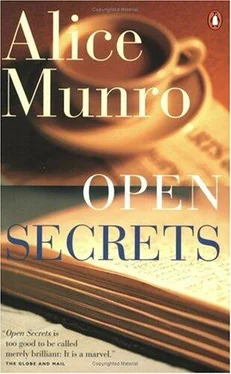Millicent was not an uneducated person herself. She had taught school. She had rejected two serious boyfriends — one because she couldn’t stand his mother, one because he tried putting his tongue in her mouth — before she agreed to marry Porter, who was nineteen years older than she was. He owned three farms, and he promised her a bathroom within a year, plus a dining-room suite and a chesterfield and chairs. On their wedding night he said, “Now you’ve got to take what’s coming to you,” but she knew it was not unkindly meant.
This was in 1933.
She had three children, fairly quickly, and after the third baby she developed some problems. Porter was decent — mostly, after that, he left her alone.
The Beck house was on Porter’s land, but he wasn’t the one who had bought the Becks out. He bought Albert and Dorrie’s place from the man who had bought it from them. So, technically, they were renting their old house back from Porter. But money did not enter the picture. When Albert was alive, he would show up and work for a day when important jobs were undertaken — when they were pouring the cement floor in the barn or putting the hay in the mow. Dorrie had come along on those occasions, and also when Millicent had a new baby, or was housecleaning. She had remarkable strength for lugging furniture about and could do a man’s job, like putting up the storm windows. At the start of a hard job — such as ripping the wallpaper off a whole room — she would settle back her shoulders and draw a deep, happy breath. She glowed with resolution. She was a big, firm woman with heavy legs, chestnut-brown hair, a broad bashful face, and dark freckles like dots of velvet. A man in the area had named a horse after her.
In spite of Dorrie’s enjoyment of housecleaning, she did not do a lot of it at home. The house that she and Albert had lived in — that she lived in alone, after his death — was large and handsomely laid out but practically without furniture. Furniture would come up in Dome’s conversation — the oak sideboard, Mother’s wardrobe, the spool bed — but tacked onto this mention was always the phrase “that went at the Auction.” The Auction sounded like a natural disaster, something like a flood and windstorm together, about which it would be pointless to complain. No carpets remained, either, and no pictures. There was just the calendar from Nunn’s Grocery, which Albert used to work for. Absences of such customary things — and the presence of others, such as Dorrie’s traps and guns and the boards for stretching rabbit and muskrat skins — had made the rooms lose their designations, made the notion of cleaning them seem frivolous. Once, in the summer, Millicent saw a pile of dog dirt at the head of the stairs. She didn’t see it while it was fresh, but it was fresh enough to seem an offense. Through the summer it changed, from brown to gray. It became stony, dignified, stable — and strangely, Millicent herself found less and less need to see it as anything but something that had a right to be there.
Delilah was the dog responsible. She was black, part Labrador. She chased cars, and eventually this was how she was going to get herself killed. After Albert’s death, both she and Dorrie may have come a little unhinged. But this was not something anybody could spot right away. At first, it was just that there was no man coming home and so no set time to get supper. There were no men’s clothes to wash — cutting out the ideas of regular washing. Nobody to talk to, so Dorrie talked more to Millicent or to both Millicent and Porter. She talked about Albert and his job, which had been driving Nunn’s Grocery Wagon, later their truck, all over the countryside. He had gone to college, he was no dunce, but when he came home from the Great War he was not very well, and he thought it best to be out-of-doors, so he got the job driving for Nunn’s and kept it until he died. He was a man of inexhaustible sociability and did more than simply deliver groceries. He gave people a lift to town. He brought patients home from the hospital. He had a crazy woman on his route, and once when he was getting her groceries out of the truck, he had a compulsion to turn around. There she stood with a hatchet, about to brain him. In fact her swing had already begun, and when he slipped out of range she had to continue, chopping neatly into the box of groceries and cleaving a pound of butter. He continued to deliver to her, not having the heart to turn her over to the authorities, who would take her to the asylum. She never took up the hatchet again but gave him cupcakes sprinkled with evil-looking seeds, which he threw into the grass at the end of the lane. Other women — more than one — had appeared to him naked. One of them arose out of a tub of bathwater in the middle of the kitchen floor, and Albert bowed low and set the groceries at her feet. “Aren’t some people amazing?” said Dorrie. And she told further about a bachelor whose house was overrun by rats, so that he had to keep his food slung in a sack from the kitchen beams. But the rats ran out along the beams and leaped upon the sack and clawed it apart, and eventually the fellow was obliged to take all his food into bed with him.
“Albert always said people living alone are to be pitied,” said Dorrie — as if she did not understand that she was now one of them. Albert’s heart had given out — he had only had time to pull to the side of the road and stop the truck. He died in a lovely spot, where black oaks grew in a bottomland, and a sweet clear creek ran beside the road.
Dorrie mentioned other things Albert had told her concerning the Becks in the early days. How they came up the river in a raft, two brothers, and started a mill at the Big Bend, where there was nothing but the wildwoods. And nothing now, either, but the ruins of their mill and dam. The farm was never a livelihood but a hobby, when they built the big house and brought out the furniture from Edinburgh. The bedsteads, the chairs, the carved chests that went in the Auction. They brought it round the Horn, Dorrie said, and up Lake Huron and so up the river. Oh, Dorrie, said Millicent, that is not possible, and she brought a school geography book she had kept, to point out the error. It must have been a canal, then, said Dorrie. I recall a canal. The Panama Canal? More likely it was the Erie Canal, said Millicent.
“Yes,” said Dorrie. “Round the Horn and into the Erie Canal.”
“Dorrie is a true lady, no matter what anybody says,” said Millicent to Porter, who did not argue. He was used to her absolute, personal judgments. “She is a hundred times more a lady than Muriel Snow,” said Millicent, naming the person who might be called her best friend. “I say that, and I love Muriel Snow dearly.”
Porter was used to hearing that too.
“I love Muriel Snow dearly and I would stick up for her no matter what,” Millicent would say. “I love Muriel Snow, but that does not mean I approve of everything she does .”
The smoking. And saying hot damn, Chrissakes, poop. I nearly pooped my pants .
Muriel Snow had not been Millicent’s first choice for best friend. In the early days of her marriage she had set her sights high. Mrs. Lawyer Nesbitt. Mrs. Dr. Finnegan. Mrs. Doud. They let her take on a donkey’s load of work in the Women’s Auxiliary at the church, but they never asked her to their tea parties. She was never inside their houses, unless it was to a meeting. Porter was a farmer. No matter how many farms he owned, a farmer. She should have known.
She met Muriel when she decided that her daughter Betty Jean would take piano lessons. Muriel was the music teacher. She taught in the schools as well as privately. Times being what they were, she charged only twenty cents a lesson. She played the organ at the church, and directed various choirs, but some of that was for nothing. She and Millicent got on so well that soon she was in Millicent’s house as often as Dorrie was, though on a rather different footing.
Читать дальше












